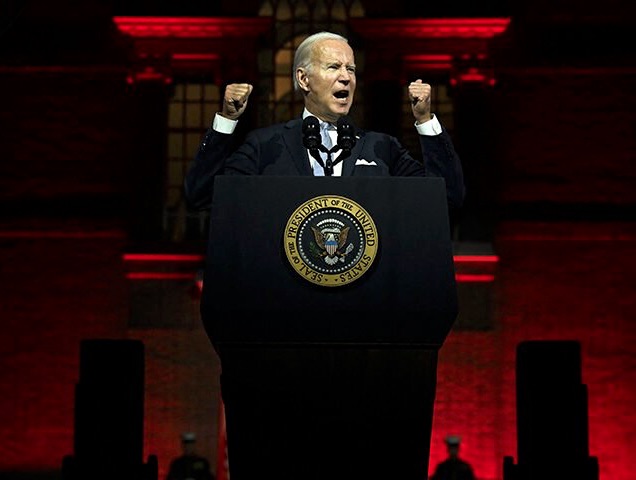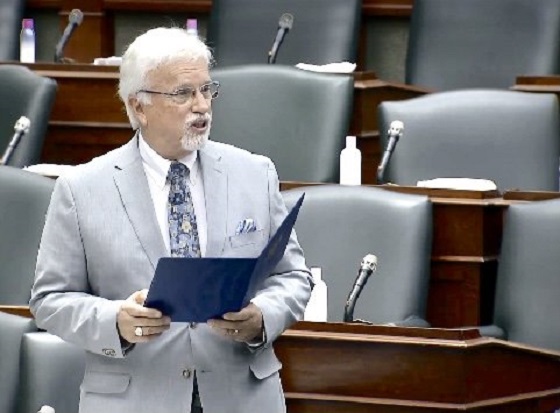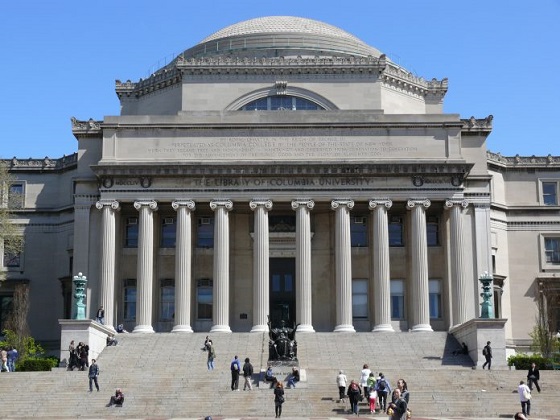Economy
Biden Is Failing The World


You can see that in Poland people are actually burning trash to stay warm. Burning trash in your fireplace creates toxic smoke. It’s hazardous. The government’s considering handing out masks so people can breathe more safely when they’re outdoors.
Recall that natural gas is the reason the United States reduced its carbon emissions more than any other country in the world. Carbon emissions have been on the decline globally, in large measure, because of the transition from coal to gas. Natural gas is something that most reasonable people agree is a superior fuel to coal. Natural gas is the reason the United States reduced its emissions by 22% between 2005 and 2020, which is five percentage points more than the United States had agreed to reduce our emissions under cap and trade legislation, which nearly passed Congress in 2010 and under the UN Paris Climate Agreement.

The above is a graph that was produced by Matthew Yglesias, a well-known progressive blogger. He tweets it out whenever somebody points out that President Biden isn’t doing all he can to expand oil and gas production. It’s accurate. It does show that oil production increased on a daily average under Biden from under Trump. But it’s deeply misleading. You have to remember that under Trump, the Coronavirus pandemic, for several months, massively slashed oil production.
You can see from the below chart of the EIA data on crude oil production that we still haven’t gotten back to where we were before the pandemic. Now consider how the need is much greater for US oil now that Europe and the United States are rejecting Russian oil.Upgrade

The United States is the biggest liquified natural gas exporter, it’s true. But it takes five years to bring online new LNG capacity in the United States. So all of the new LNG that’s come online during Biden’s presidency was due to past presidents.
And Biden has leased less land than any President since World War II. It’s a shockingly small amount of land: 130,000 acres as opposed to seven million acres under Obama, four million acres under Trump, during the first 19 months of their administrations. It’s a huge reduction in the amount of land being leased.
You can see that in some particular cases, like a very large oil and gas sale in Alaska, the Department of Interior claimed there wasn’t any industry interest in the lease. This turned out not to be the case. The Senator from Alaska, Lisa Markowski said, “I can say with full certainty based on conversations as recently as last night, that Alaska’s industry does have an interest in lease sales and the Cook Inlet to claim otherwise is simply false, not to mention stunningly shortsighted.”

People point out the oil and gas industry does have many thousands of leases, and that’s true, but there’s a high degree of uncertainty about whether the leases they have will produce oil and gas at levels that make sense economically to produce from.
So increasing oil and gas leasing at a time of an energy crisis in Europe seems like a no-brainer, but the Biden administration is not doing that. In fact, it’s been preventing the expansion of gas in many other ways.
You can see the Biden administration denied a request to have a formaldehyde regulation exempted. All else being equal, you’d wanna reduce that pollution. But I think a little bit of formaldehyde is gonna be a less toxic airborne event than having people breathing toxic wood and plastic smoke in Europe. The right thing to do, in terms of aiding our allies, would be to wave that regulation. But the Biden administration refused.

You can see that the Biden administration is actively considering forgoing all new offshore drilling in the Atlantic and Pacific. It may do no offshore leases at all for oil and gas.
Instead, the Biden administration has sought to give sanctions relief to Venezuela in the hopes that Venezuela would produce more oil. And of course, most famously Biden went to Saudi Arabia to ask the Saudis to produce more oil in July. Now, everybody agrees that was a huge foreign policy failure. The Saudis announced they would be cutting production with the rest of OPEC+. The Biden administration’s pressure on the Saudis apparently annoyed them. Now, they’ve been pushed closer into the arms of Russia. This is a pretty significant setback for the Biden administration.
At the same time Biden was going to Venezuela and Saudi Arabia to produce more oil. Biden administration was refusing to even meet with oil and gas executives. That’s a pretty serious snub when you consider that it’s an industry you want to expand production.
An oil and gas analyst on Twitter criticized a Senator from Wisconsin for suggesting the Democrats are responsible for the lack of refining capacity. He said, “What — do you also blame a political party for a flat tire?”
I pointed out that a single oil refinery outage would have little impact if we had sufficient refinery capacity, and the reason we don’t is that politicians, mostly Democrats have used regulations to prevent their construction. When I interviewed executives one said to me, “If you were an oil company, why would you invest hundreds of millions of dollars into expanding refining capacity if you thought the federal government would shut you down in the next few years? The narrative coming out of this administration is absolutely insane.”

So you can see here that refinery capacity was increasing all the way through 2020. It then declined due to the pandemic. And it has not risen since then. When the analyst was asked, why don’t we get more refineries? He clearly didn’t know. Or at least he said he didn’t know. But it’s clear the Biden administration has not wanted more refineries.
There was a chance to retrofit a major refinery in the US Virgin Islands. It was a refinery that was older. It needed pretty significant upgrades. It was polluting. But these are machines that can be fixed. Several billion dollars of investment would’ve fixed it and it goes back many years. This is an article from 2008. It describes how, at that time, the Democrats in the Senate killed a proposal for refinery expansion.
Go back to 2006. The same thing happened. The House was in the hands of the Republicans who passed a piece of legislation to expand refineries. And it was the Democrats who killed it. And, incidentally, they’re using the exact same arguments today that they used back then.
More recently, we’ve seen an attack on expanded natural gas pipeline capacity, including from Pennsylvania to the Northeast, particularly to Boston. The result of not having pipeline capacity is that they’ve been burning more oil for electricity in New England. In fact, oil-fired power jumped to a four-year high earlier this year. And they’ve been having to import liquified natural gas to New England rather than just pipe it in, which is significantly cheaper. Probably half as expensive.

Grassroots advocacy and lawsuits have prevented pipelines from being built. You can see there’s a strong correlation between the price of natural gas and the ability to get pipelines built. We stop building pipelines and gas gets more expensive. Globally, the impact is that we’re gonna return to coal. This is the consequence of stifling oil and gas production.
One could argue that we just need more scarcity in order to accelerate the transition to electric cars. But it’s notable that the major figures in this, including President Biden, supporters of President Biden, and representatives of his administration aren’t defending a pro-scarcity position. They’re instead claiming that they’re doing all they can to bring down oil and gas prices and expand production.
I think this data, and the historical chronology, paint a picture that shows that there has, in fact, been a war on natural gas and oil United States and that it is impacting global supplies, and leaving Europe vulnerable.
Click to see the video presentation of this article. Additional slides and graphs are in the video.
Business
WEF panelist suggests COVID response accustomed people to the idea of CBDCs

Central Bank of Bahrain governor Khalid Humaidan
From LifeSiteNews
When asked how he would convince people that CBDCs would be a trusted medium of exchange, Bahrain’s central bank governor said that COVID made the digital transformation ‘something of a requirement’ that had ‘very little resistance.’
Central bank digital currencies (CBDCs) will hopefully replace physical cash and become fully digital, a central banker tells the World Economic Forum (WEF).
Speaking at the WEF Special Meeting on Global Collaboration, Growth and Energy Development on Sunday, Central Bank of Bahrain governor Khalid Humaidan told the panel “Open Forum: The Digital Currencies’ Opportunity in the Middle East” that one of the goals of CBDC was to replace cash, at least in Bahrain, and to go “one hundred percent digital.”
Humaidan likened physical cash to being an antiquated “analogue” technology and that CBDC was the digital solution that would hopefully replace cash:
"We're probably going to stop calling it central bank digital currency [CBDC]. It's going to be a digital form of cash, and at some point in time hopefully we will be able to be 100% digital": Central Bank of Bahrain Governor Khalid Humaidan to the WEF https://t.co/Pspr0M1Uuq pic.twitter.com/N5aOkCpzh1
— Tim Hinchliffe (@TimHinchliffe) April 29, 2024
“I thank this panel and this opportunity. It forced me to refine my thoughts and opinions where I’m at a place comfortably now that I’m ready to verbalize what I think about CBDC,” said Humaidan.
If we think cash is the analogue and digital currency is the form of digital – CBDC is the digital form of cash – today, clearly we’re in a hybrid situation; we’re using both.
We know in the past when it comes to cash, central bankers were very much in control with all aspects of cash, and now we’re comfortable to the point where the private sector plays a big role in the printing of the cash, in the distribution of the cash, and with the private sector we use interest rates to manage the supply of cash.
The same thing is likely to happen with CBDC. Yes, the central bank will have a role, but at some point in time – the same way we don’t call it ‘central bank cash’ – we’re probably going to stop calling it central bank digital currency.
“It’s going to be a digital form of the cash, and at some point in time hopefully we will be able to be one hundred percent digital,” he added.
When asked how he would convince people that CBDC would be a trusted medium of exchange, Bahrain’s central bank governor said that people were already used to it and that COVID made the digital transformation “necessary” and “something of a requirement” that had “very little resistance.”
"There's less use of cash […] The transition to fully digital is not going to be a stretch […] People are used to it […] Its adoption rates increased because of COVID […] There is very little resistance": Central Bank of Bahrain Governor Khalid Humaidan to the WEF on CBDC pic.twitter.com/zB7nJAi48G
— Tim Hinchliffe (@TimHinchliffe) April 29, 2024
“Right now, many of our payments are digital. The truth is, I said that we’re in a hybrid model; there’s less and less use of cash,” said Humaidan.
I think from predominantly digital with a little physical, I think the transition to fully digital is not going to be a stretch.
People are used to it, people have engaged in it and certain circumstances did help. Its adoption rates increased because of COVID.
“This is where contactless started to become something of a necessity, something of safety, something of a requirement, and because of that there is very little resistance; trust is already there,” he added.
"Is it [digital euro] going to be as private as cash? No. A digital currency will never be as anonymous and as protecting of privacy in many respects as cash, which is why cash will always be around": Christine Lagarde, BIS Innovation Summit, March 2023 #CBDC pic.twitter.com/BLMVOPax6a
— Tim Hinchliffe (@TimHinchliffe) April 11, 2023
Meanwhile, European Central Bank president Christine Lagarde has been going around the world telling people that the digital euro CBDC would not eliminate cash, and that cash would always be an option.
Speaking at the Bank for International Settlements (BIS) Innovation Summit in March 2023, Lagarde said that a digital currency will never be as anonymous as cash, and for that reason, cash will always be around.
“Is it [digital euro] going to be as private as cash? No,” she said.
A digital currency will never be as anonymous and as protecting of privacy in many respects as cash, which is why cash will always be around.
If people want to use cash in some countries or in some transactions, cash should be available.
“A digital currency is an alternative, is another means of payment and will not provide exactly the same level of privacy and anonymity as cash, but will be pretty close in terms of complete neutrality in relation to the data,” she added.
A WEF Agenda blog post from September, 2017, lists the “gradual obsolescence of paper currency” as being “characteristic of a well-designed CBDC.”
"You could have a potentially […] darker world where the government decides that [CBDC] can be used to purchase some things, but not other things that it deems less desirable like say ammunition, or drugs, or pornography, or something of the sort": Eswar Prasad, WEF #AMNC23 pic.twitter.com/KkWgaEWAR5
— Tim Hinchliffe (@TimHinchliffe) June 28, 2023
Last year at the WEF’s 14th Annual Meeting of the New Champions, aka “Summer Davos,” in Tianjing, China, Cornell University professor Eswar Prasad said that “we are at the cusp of physical currency essentially disappearing,” and that programmable CBDCs could take us to either a better or much darker place.
“If you think about the benefits of digital money, there are huge potential gains,” said Prasad, adding, “It’s not just about digital forms of digital currency; you can have programmability – units of central bank currency with expiry dates.
You could have […] a potentially better – or some people might say a darker world – where the government decides that units of central bank money can be used to purchase some things, but not other things that it deems less desirable like say ammunition, or drugs, or pornography, or something of the sort, and that is very powerful in terms of the use of a CBDC, and I think also extremely dangerous to central banks.
The WEF’s Special Meeting on Global Collaboration, Growth and Energy Development took place from April 27-29 in Riyadh, Saudi Arabia.
“Saudi Arabia’s absolute monarchy restricts almost all political rights and civil liberties,” according to D.C.-based NGO Freedom House.
In the kingdom, “No officials at the national level are elected,” and “the regime relies on pervasive surveillance, the criminalization of dissent, appeals to sectarianism and ethnicity, and public spending supported by oil revenues to maintain power.”
Reprinted with permission from The Sociable.
Automotive
Canadian interest in electric vehicles falls for second year in a row: survey

From LifeSiteNews
Canadians’ disinterest in electric vehicles comes as the Trudeau government recently mandated that all new light-duty vehicles in Canada are zero emission by 2035.
Research has revealed that Canadians are increasingly unwilling to purchase an electric vehicle (EV).
According to an April 22 survey from AutoTrader, Canadians remain skeptical of Prime Minister Justin Trudeau’s electric vehicle mandate and ongoing advertisement surrounding electric vehicles, as interest in owning one dropped for a second year in a row.
“Overall, while almost half of non-EV owners are open to buying an EV for their next vehicle, interest in EVs has declined for the second year in a row,” reported Tiffany Ding, director of insights and intelligence at AutoTrader.
In 2022, at least 68 percent of Canadians were interested in buying an electric vehicle. However, by 2023, the number declined to 56 percent. So far in 2024, there is even less interest, with only 46 percent saying they were open to purchasing one.
“AutoTrader data shows a direct correlation to gas prices and EV interest, and since gas prices have normalized from their peak in 2022, EV interest has also dropped,” a summary of the survey explained.
However, Canadians did show a slight increase of interest in hybrid vehicles, with 62 percent of those looking to purchase an electric vehicle saying they would look at a gas-electric hybrid, compared with 60 percent in 2023.
The survey also questioned Canadians regarding Trudeau’s Zero Emission Vehicle (ZEV) mandate, which requires all new light-duty vehicles in Canada are zero-emission by 2035, essentially banning the sale of new gasoline/diesel-only powered cars.
The mandate comes despite warnings that it would cause massive chaos by threatening to collapse the nation’s power grids.
“Over 75 percent of respondents are aware of the federal government’s ZEV mandate, which requires all new light-duty vehicles sold in Canada to be zero-emission by 2035,” the survey found.
However, the respondents revealed that they believe it’s “unlikely that Canada will be able to meet the federal government’s ZEV target due to the current inadequate charging infrastructure or a change in political power that could revoke or amend the ZEV mandate timeline.”
Canadians’ concerns in buying an electric vehicle include limited travel range/distance, inadequate availability of charging stations, higher purchasing costs, and concerns that they do not perform well in cold weather.
Indeed, this winter, western Canadians experienced firsthand the unreliability of Trudeau’s “renewable” energy scheme as Alberta’s power grid nearly collapsed due to a failure of wind and solar power.
Trudeau’s plan has been roundly condemned by Canadians, including Alberta Premier Danielle Smith. In 2022, Smith denounced a federal mandate that will require all new cars sold after 2035 to be “zero emission” electric (EVs) vehicles and promised that Albertans will always have the choice to buy gasoline-powered cars.
Since taking office in 2015, Trudeau has continued to push a radical environmental agenda similar to the agendas being pushed the World Economic Forum’s “Great Reset” and the United Nations’ “Sustainable Development Goals.”
The reduction and eventual elimination of the use of so-called “fossil fuels” and a transition to unreliable “green” energy has also been pushed by the World Economic Forum (WEF) – the globalist group behind the socialist “Great Reset” agenda – an organization in which Trudeau and some of his cabinet are involved.
The Trudeau government’s electric vehicle plan comes despite the fact Canada has the third largest oil reserves in the world. Electric cars cost thousands more to make and buy, are largely considered unsuitable for Canada’s climate as they offer poor range and long charging times during cold winters and have batteries that take tremendous resources to make and are difficult to recycle.
-

 Alberta2 days ago
Alberta2 days agoAlberta threatens to fight Trudeau government restrictions on Canada’s plastics industry
-

 COVID-192 days ago
COVID-192 days agoFormer Canadian lawmaker has no regrets about refusing COVID shot despite losing his job
-

 COVID-191 day ago
COVID-191 day agoPeckford: Hallelujah! Supreme Court of Canada to hear Newfoundland and Labrador charter case
-

 Uncategorized24 hours ago
Uncategorized24 hours agoMaking Alberta a geothermal energy leader
-

 Alberta23 hours ago
Alberta23 hours agoAlberta’s vision for passenger rail
-

 Alberta1 day ago
Alberta1 day agoThree Calgary massage parlours linked to human trafficking investigation
-

 Alberta1 day ago
Alberta1 day agoCanada’s postal service refuses to help with Trudeau’s gun ban buyback program: report
-

 conflict12 hours ago
conflict12 hours agoColumbia on Lockdown After pro-Palestinian Protesters Take Over Building, Hold Janitors Hostage









